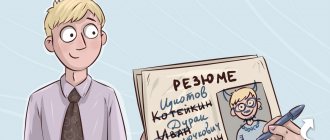Is it difficult for you to start studying at 25-30-35-40-45? Not corporate, not paid according to the “office pays” tariff, not forced and once under-received higher education, but independent? Sit down at your desk with the books and textbooks you have chosen, in the face of your strict self, and master what you need or wanted to master so much that you simply don’t have the strength to live without this knowledge? This is perhaps one of the most difficult intellectual processes of adult life: the brain is creaking, there is little time, everything is distracting, and the motivation is not always clear. Self-education is an important element in the life of absolutely any professional, but it is fraught with certain difficulties. Let's figure out how best to organize this process so as not to push yourself and get results.
This is the last part of the cycle “Live and Learn”:
Part 1. School and career guidance Part 2. University Part 3. Additional education Part 4. Education at work Part 5. Self-education
Share your experience in the comments - maybe, thanks to the efforts of the RUVDS team and Habr readers, training will turn out to be a little more conscious, correct and fruitful.
What is self-education?
Self-education is self-motivated learning, during which you focus on acquiring the knowledge that you think you need most at the moment.
Motivation can be completely different: career growth, a new promising job, the desire to learn something interesting to you, the desire to move into a new field, etc. Self-education is possible at any stage of life: a schoolchild fanatically studies geography and buys all the books and maps, a student immerses himself in studying microcontroller programming and fills his apartment with incredible DIY things, an adult tries to “enter IT”, or finally get out of it and become cool designer, animator, photographer, etc. Fortunately, our world is quite open and self-education without paper can bring not only pleasure, but also income.
For the purposes of our article, we will look at the self-education of an adult working person - it’s very cool: busy with work, family, friends and other attributes of adult life, people find time and begin to study JavaScript, Python, neurolinguistics, photography or probability theory. Why, how, what will it give? Isn’t it time for you to sit down with books (the Internet, etc.)?
Connect with like-minded people
Focus on people who are interested in the same things as you. This way you can share new information with each other and have interesting discussions.
If we are talking about the Internet space, choose thematic groups and forums where they communicate on a topic that interests you.
But if possible, give preference to live communication. This way you will not only increase your level of knowledge, but also improve your communication skills, improve your emotional intelligence and the ability to be an interesting interlocutor. Also, live communication will help you reduce the level of conflict and increase the level of tolerance, teaching you to respect the opinions of others.
Events where you can learn something new can be found in your city by searching online. As a last resort, you can organize such a meeting yourself by advertising the date and time on your page on social networks or in popular groups in your city.
An important tip for self-education is to unsubscribe from entertainment public pages and subscribe to interest groups. If there is useful content in the news feed, it will be processed and stored in memory.
Black hole
Self-education, having begun as a hobby, easily develops into a black hole and absorbs time, energy, money, occupies thoughts, distracts from work - because it is a motivated hobby. To avoid this situation, it is important to come to an agreement with yourself and your educational impulse even before starting classes with yourself.
- Indicate the context of self-education - why you decided to do this, what you will get in the end.
Think carefully about how the new information will fit into your education and work, and what practical benefits you will get from the classes. For example, you want to study psychology and are a fan of cars, which means you choose which books to buy, what to immerse yourself in, which university to go to for additional education in the future. Okay, let's try to agree: if you delve into the car business, you can go to a car service center or create your own. Cool! Do you have investments, a unique offer that will set you apart from the rest, how will you work with competitors? Oh, just to repair your car, well, that’s interesting! And you have a garage, but if you pull the injection engine, what time do you have? Wouldn't it be easier to go to a service center and watch an F1 race? Plan B is psychology. For myself? Not bad, it will improve your soft skills in any case. For the future? Quite - for raising your children or organizing a career guidance office for teenagers and students, so that they don’t get too hung up on the market. Logical, profitable, reasonable. - Set goals for self-education: what do you want to study and why, what will this process give you for: pleasure, income, communication, career, family, etc. It will be great if the goals are not just outlined, but developed as a step-by-step training plan.
- Be sure to indicate the boundaries of knowledge - how much information you have to master. Every subject, every narrow branch of knowledge has an immeasurable depth of study, and you can simply drown in information and attempts to grasp the immensity. Therefore, draw up a curriculum for yourself that will indicate the subject areas you need, the boundaries of study, mandatory topics, and sources of information. This can be done, for example, using the mind maps editor. Of course, you will move away from this plan as you master the topic, but it will not allow you to fall into the depths of the accompanying information (for example, while studying Python, you suddenly decide to go deeper into mathematics, begin to delve into complex theorems, immerse yourself in the history of mathematics, etc. , and this will be a departure from the plan into a new interest - the true enemy of a person engaged in self-education).
Find time
The first thing you need to start with to engage in your education is to find time to gain knowledge. You have it, even if you are very busy.
When can I study books?
- In public transport. If it takes a long time to get to the office, spend it reading instead of sleeping or talking on the phone. Those who get motion sickness in transport can use audiobooks and listen to them instead of music.
- On a walk. If you walk in the evenings on your own or with your dog, you can listen to an audiobook and get enlightened at the same time.
- In the cafe. Gain new knowledge over a cup of coffee or a delicious lunch. A paper or e-book won't take up space in your bag, but you can use every free minute to read.
- Housework. Turn on an audiobook or useful videos that you can listen to while you cook, iron, or clean. Even if the information sounds in the background, it is still perceived and remains in the head.
Interestingly, scientists have calculated that if you devote just 2 hours a day to self-education, you will have time to listen to up to 150 audiobooks a year. Such a volume of information cannot but bring practical benefits.
Pros of self-education
You can try new non-standard teaching methods
: combine them, test them, choose the most comfortable one for yourself (reading, video lectures, notes, studying by the hour or at intervals, etc.). In addition, you can easily change your training program if the technology changes (for example, mercilessly quit C# and switch to Swift). You will always be relevant within the learning process.
Depth of training
— since there are no restrictions on classroom time and the teacher’s knowledge, you can study the material from all sides, focusing on those points that you need. But be careful - you can bury yourself in information and thereby slow down the whole process (or even quit).
Self-education is inexpensive or even free.
You pay for books (the most expensive part), for courses and lectures, for access to certain resources, etc. In principle, training can be made completely free - you can find high-quality free materials on the Internet, but without books the process will lose quality.
You can work with information at your own pace
- write down, draw diagrams and graphs, return to already mastered material in order to deepen it, clarify unclear points and close gaps.
Self-discipline skills develop
— you learn to organize your work and free time, negotiate with colleagues and family. Oddly enough, after a month of strict time management, a moment comes when you realize that there is more time.
Learn a foreign language
First of all, sign up for English courses, because this is what the whole world speaks. It will come in handy when traveling to any country, because hotel and restaurant staff are required to learn English.
Another reason to learn this particular language is that most works, scientific discoveries and world-class achievements are published primarily in English. Knowing it, you can always keep abreast of the latest trends in the global community.
In addition, you need to consider that if you learn only 10-20 new words, but every day, your memory will always be in good shape and the risk of dementia in the future will be significantly reduced.
Disadvantages of self-education
In Russian realities, the most important disadvantage is the attitude of employers who require confirmation of your qualifications
: real projects or educational documents. This does not mean that the company’s management is bad and disloyal - it means that it has already encountered such “educated people” who ran away from trainings on how to earn a million in a day. Therefore, it’s worth getting real reviews on projects (if you are a designer, advertiser, copywriter, etc.) or a good pet project on GitHub that will clearly demonstrate your development skills. But it is best, based on the results of the self-educational process, to go to courses or to a university and receive a certificate/diploma - alas, for now there is more faith in him than in our knowledge.
Limited areas for self-education.
There are many, many of them, but there are groups of specialties that cannot be mastered independently for work, and not “for oneself” and one’s own interest. These include all branches of medicine, motor transport and the transport sector in general, oddly enough - sales, many blue-collar specialties, engineering, etc. That is, you can master all the textbooks, standards, manuals, etc., but at the moment when you have to be ready for practical actions, you will find yourself a helpless amateur.
For example, you can know all the anatomy, pharmacology, master all treatment protocols, understand diagnostic methods, learn to recognize diseases, read tests and even select a treatment plan for common pathologies, but as soon as you, God forbid, encounter a stroke in a person, ascites, with pulmonary embolism - that's all, the only thing you will be able to do is dial 03 with wet pens and drive away the onlookers. You will even understand what happened, but you will not be able to help. If, of course, you are a sane person.
Little motivation.
Yes, self-education at first is the most motivated type of learning, but in the future your motivation will continue to depend only on you and your desire, and not on the alarm clock. This means that your motivation factor will be household chores, entertainment, overtime, mood, etc. Quite quickly, breaks begin, days and weeks are missed, and you may have to start studying again a couple of times. In order not to deviate from the plan, you need an iron will and self-discipline.
It's hard to concentrate.
In general, the degree of concentration greatly depends on the place where you are going to study. If you live with a family and they are not used to respecting your space and time, consider yourself unlucky - your impulses to learn will quickly eat up your conscience, which will force you to help your parents and play with your children. For some, my option is more suitable - to study in the office after work, but this requires the absence of chatty employees and permission from management (however, out of 4 times I never had to face misunderstanding).
Be sure to organize your workplace and time - the atmosphere should be educational, businesslike, because in essence these are the same classes, but with a high level of self-confidence. Wouldn’t it occur to you to suddenly open YouTube or watch the next part of a good TV series at the second higher level?
There is no tutor, no mentor, no one corrects your mistakes, no one shows how easier it is to master the material.
You may misunderstand some part of the material, and these erroneous judgments will continue to create a lot of problems in further learning. There are not many ways out: the first is to double-check all dubious places in different sources until it is completely clear; the second is to find a mentor among friends or at work so that you can ask him questions. By the way, your studies are not their headache, so formulate questions clearly and concisely in advance in order to get the correct answer and not waste someone else’s time. And of course, nowadays there is another option: ask questions on Toaster, Quora, Stack Overflow, etc. This is a very good practice that will allow you not only to find the truth, but also to evaluate different approaches to it.
Self-education doesn't end there
- you will be haunted by a feeling of incompleteness, lack of information. On the one hand, this will stimulate you to study the issue even deeper and become a pumped-up specialist, on the other hand, it can slow down your development due to doubts about your own competence.
The advice is simple: as soon as you understand the basics, look for ways to put your knowledge into practice (internships, your own projects, company help, etc. - there are plenty of options). This way, you will be able to evaluate the practical value of everything you study, you will understand what is in demand by the market or a real project, and what is just a beautiful theory.
Self-education has an important social nuance
: you learn outside of a social environment and interaction with others is minimized, achievements are not assessed, there is no criticism and no rewards, there is no competition. And if in mathematics and development this is for the better, then in learning languages “silence” and isolation are bad allies. Plus, studying on your own delays deadlines and reduces your chances of getting into a job in the field you're studying.
Practice and repeat
Theoretical knowledge will only be useful when it turns into practical experience. Therefore, during the learning process, try to look for where you can apply the acquired skills. This way you can monitor what you need to pay more attention to and in which direction it is better to move.
Try to find free but effective ways to practice:
- conversation with a native speaker of the foreign language you are studying;
- master class on mastered skills;
- presentation of a new work by an expert you are interested in.
This way you will not only broaden your horizons, but also make new acquaintances that will be useful in the future.
Sources for self-education
In general, self-education can take any form - you can cram the material in the evenings, you can interact with it at the first opportunity in every free minute, you can take courses or get a second higher education and continuously independently deepen the knowledge acquired there.
But there is a set without which self-education is simply impossible - no matter what online schools, Skype teachers and coaches say. Books.
It doesn’t matter whether you study psychology, anatomy, programming or tomato agricultural technology, nothing can replace books. You will need three types of books to study any field:
- The classic basic textbook
is boring and cumbersome, but with a good structure of information, a well-thought-out curriculum, correct definitions, wording and the right emphasis on basic things and some subtleties. (Although there are also non-boring textbooks - for example, Schildt’s excellent reference books on C/C++). - Hardcore professional publications
(like Stroustrup or Tanenbaum) are deep books that need to be read with a pencil, pen, notebook and a pack of sticky notes. Those publications that you need to understand and from which you will gain deep theoretical knowledge and the basics of practice. - Scientific books on the topic
(such as “Python for Dummies”, “How the Brain Works”, etc.) are books that are interesting to read, that are easy to remember, and that explain the operation of the most complex systems and categories in a straightforward manner. Be careful: in our times of rampant infogypsy, you can run into charlatans in any field, so read carefully about the author - it’s better if he’s a scientist at some university, a practitioner, and preferably a foreign author; for some reason unknown to me, they write very coolly, even in very good translations).
It is important to understand that there are areas where foreign authors are, for the most part, completely useless, such as law and accounting. But in such areas (as, indeed, in others) it is worth remembering that any industry operates in a legal framework and it would be a good idea to study the basic legal acts
. For example, if you decide to become a trader, it is not enough for you to install QUIK and take the BCS online course; it is important to study the legislation related to the circulation of securities, the website of the Central Bank of the Russian Federation, the tax and civil code. There you will find accurate and comprehensive answers to your questions. If you find it difficult to interpret, look for comments in periodicals and legal systems.
Notebook, pen.
Write notes, even if you hate them and the computer is your friend. Firstly, you will remember the material better, and secondly, turning to material designed in your own way is much easier and faster than looking for something in a book or video. Try not to just roll out the text as is, but structure the information: draw diagrams, develop icons for lists, a system for marking sections, etc.
Pencil, stickers.
Make notes in the margins of the books and place sticky notes on the relevant pages, writing a description of why that page needs to be consulted. It greatly facilitates repeated reference and improves memorization.
English language.
You may not speak it, but reading it is highly advisable, especially if you are self-studying in the IT field. Now I really want to be a patriot, but many books have been written much better than Russian ones - in the IT sphere, in stock exchange and brokerage, in economics and management, and even in medicine, biology and psychology. If you really have trouble with the language, look for a good translation - as a rule, these are books from large publishers. The originals can be purchased electronically and in print from Amazon.
Lectures on the Internet
— there are a lot of them on university websites, on YouTube, in specialized groups on social networks, etc. Choose, listen, take notes, advise others - choosing an adequate course is very difficult!
If we are talking about programming, then your faithful assistants are Habr, Medium, Toaster, Stack Overflow, GitHub
, as well as various projects for learning how to write code such as Codecademy, freeCodeCamp, Udemy, etc.
Periodicals
— try to find online and read specialized magazines to know what your industry is about, what people are its leaders (as a rule, they are the ones who write articles).
For the most stubborn people there is another superpower - free attendance at university classes
. You negotiate with the faculty you need and sit quietly listening to lectures that you need or are interested in. To be honest, it’s a little scary to approach for the first time, rehearse your motivation at home, but they very rarely refuse. But this requires a lot of free time.
Train not only your muscles, but also your memory
Accept the fact that any problematic situation is an additional opportunity to gain new information. It doesn't matter if you're arguing with your friends about who started the Cold War or helping a friend fix his car, you're sure to learn something new in each case.
Therefore, there is no need to react negatively to problems, take them as a chance to learn something new.
In each case, try to remember some numbers or facts. This way you will train your memory, expand your stock of knowledge and be able to show off your erudition on occasion.
Stop procrastinating on studying
The most important thing to calm down is to put things off for an hour, which eventually stretches out over the whole day. And then the next day. And for the whole week. During this time, you manage to replay The Witcher, send a ton of messages on VKontakte, stick to Telegram, hang out with friends. And the textbook still lies on the table, covered with dust.
All you had to do was just sit down, open this textbook, take a notebook and pen, and start studying. The sooner you start, the sooner you will finish.
By the way, this is precisely the principle that our parents drilled into us when we had to do our homework. Generally correct principle. It’s just that in our adult life we have completely forgotten it.
Kinds
What is it, and what advantages of self-education have you already understood, now I want to introduce you to its variety:
- Household. Learning something during leisure time or to perform household chores.
- Cognitive. Replenishment of information about the surrounding world.
- Self-realization. Development of intellectual abilities, or physical fitness and endurance, spirituality and morality. You can read about ways to develop your physical fitness here.
- Professional. Improving your skill level in order to achieve success and advance in your career and gain social recognition and approval.
Make a plan and follow it
Make a detailed plan for your self-development, setting a goal at each stage that needs to be achieved. Write down in detail what you need to do and in what order to achieve the desired result.
Without this, there is a risk that you will quit halfway or be less effective in the learning process.
It is important to keep your to-do list in front of your eyes at all times. This way you can switch between tasks and maintain a sober view of the situation. For example, if you are tired of listening to lectures, start learning English words, and then read or listen to an interesting book. This way you can avoid burnout and reach your goal faster.
Make a self-study plan for the next two months, detailing each week. You will be surprised how unnoticed this time will fly by and how much new knowledge will be in your head.
Start taking notes
Writing something on paper is a very effective method so that your attention does not start to wander somewhere to the side, and you do not quit the activity in the first few minutes. Taking notes helps you structure your thoughts and remember better.
When memorizing information, it tends to get lost and disappear somewhere - only the most basic and most important is “compacted” in the consciousness. This is how our brain works. While you are writing, you seem to be saying to yourself what is written in the book, and it sticks better in your consciousness.
Follow the schedule
Working out at the same time is extremely important. Scientists who work on the phenomenon of memory have found that knowledge fits well in the head if you study regularly and at the same time. The brain adapts to our daily routine. It is clear that the pace of life in a modern city is high and we are sometimes forced to change plans, however, try to reduce to a minimum all situations that would distract you from your studies.
How much time should you allocate? A standard academic hour lasts 45 minutes, so we focus on this time.
By the way, it was not taken out of thin air. It has long been noted that after 45 minutes, students’ attention is scattered, concentration disappears, and the necessary information ceases to “compact” in the consciousness. You definitely need to take a break or continue studying tomorrow.
Photo source rawpixel.com/freepik
Target
If you want to learn, first understand why.
I want to become a professional internet marketer – that’s my goal.
I want to defend my dissertation on marketing – that’s my goal.
I want to improve my knowledge of marketing - that’s not the goal. Where exactly should I pull them? Towards a dissertation or towards practical work? The path to them is different. One will have to storm the history and philosophy of marketing and learn to conduct marketing analysis in his head. The second one needs a textbook on Yandex.Metrica and SEO.
I want to learn to read Chinese.
I want to learn how to cook haute cuisine.
I want to study postmodern philosophy.
What do you want? Be specific.
Why study all your life: understanding the meaning of education and self-education
Many of us have asked our parents at least once in our lives: “Why do we need to study?” Perhaps one day such a question will overtake you, because children, as a rule, are not very keen on knowledge, they are more interested in abstract matters and not related to their studies. What do you think is the point in the education process? Is it necessary to learn, and how do you feel about the concept of lifelong learning? In the article we will talk about why you need to study all your life and talk about related topics. Read more…
7
Choosing a time
If we continue the topic “Where should a person begin to educate himself,” then in no case should we ignore the choice of the optimal time. You should not hope that you will read the necessary literature or listen to lectures when you have time. This is a failed path in advance. There will never be time, you can believe it. There is always some urgent and extremely important matter.
So decide that every day (or just on weekdays) you will read or listen to selected books while jogging, driving to or from work, one hour before bed. It is very important not to get out of this schedule. Over time, there will definitely be a desire to postpone the matter or give yourself a little indulgence. If you are led by your laziness, you can immediately give up self-education, which means this is not for you.
Work on mistakes
Mistakes are experience and they are normal. Don't be afraid to allow them. Let more practice into your life, analyze your mistakes, remember them, don’t be afraid to work on them. Goes very rarely come true without mistakes, so don’t be discouraged.
Self-education is very interesting, but labor-intensive. The main thing you need to understand is that difficulties make you stronger, and if you have taken the path of self-education, do not turn back. Make changes, vacations, but don’t give up and everything will work out, because believing in yourself is the best motivator.
How to create your own self-learning system
Behind every success is a system or strategy. It helps both at the learning stage and during work. A self-learning system is a systematic way of weeding out unnecessary information and remembering what is most necessary. You've probably made attempts to learn something: a programming language or a foreign language. And, most likely, you didn’t have a special strategy: a minimum of free time and hope for a ready-made guide or list of books. You started to study, but at the same time you intuitively understood that you were doing something wrong. You simply lacked your system. And the sooner you start it, the faster you will begin to benefit. Read more…
8











